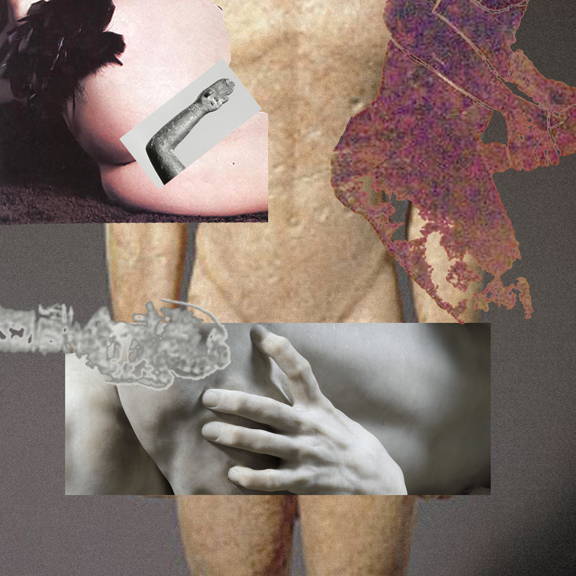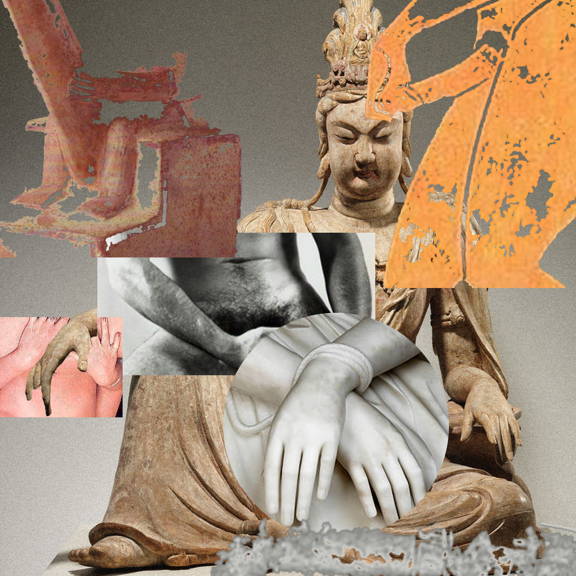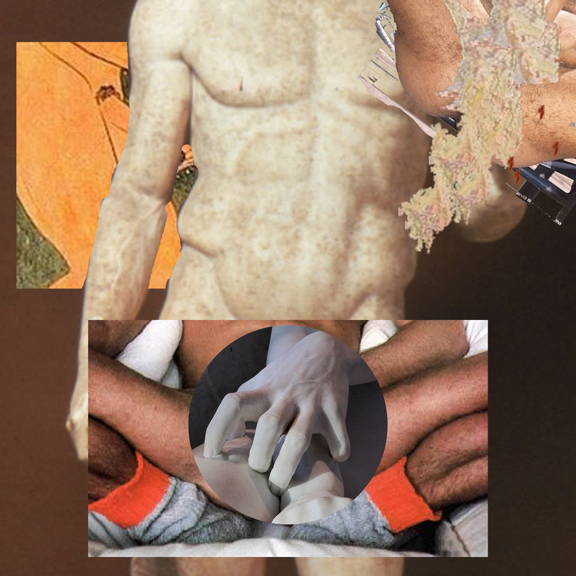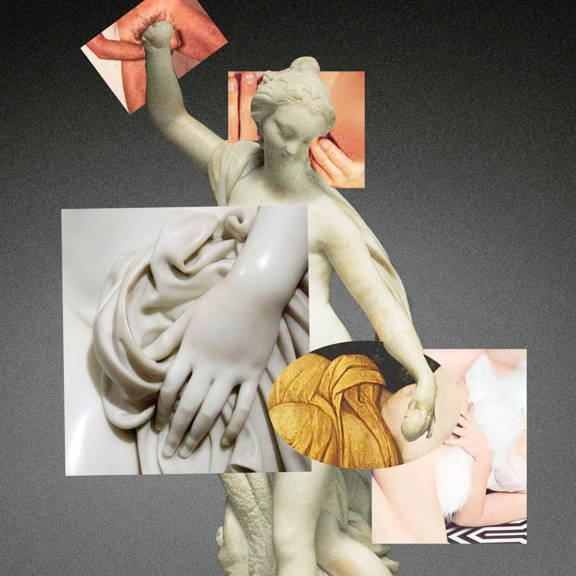The History and The Complexity of Masturbation with Sarah Lorimar
*trigger warning: this article has mentions of genial mutilation and torture
“I would love to know the thought process of the person who first locked eyes with a goat and thought, ‘Mmm. I reckon that eyelid would feel pretty good around my cock’.”

Masturbation - wanking, rubbing one out, or having a mazz - involves touching parts of your own body for sexual pleasure. For many people, masturbating happened early in their lives and by accident, whether it was noticing it felt good when they rubbed their body against something or curiously touching themselves in the bathtub.
To many, masturbation is a reliable source of comfort and pleasure. But it can also be a source of misinformation, personal shame and taboo. Some people were able to explore their bodies in private, while others were being taught that masturbation is ‘sinful’. Our bodies remember the way we felt about sexuality when we were younger, even if our minds don’t. Masturbation can be tricky to navigate for those who felt they couldn’t explore their bodies when they were younger.
Throughout history, the beliefs and attitudes about masturbation have fluctuated wildly. Largely influenced by cultural and religious narratives, masturbation has been a prominent market of moral value. So how did so many different beliefs come about?
It was said ancient Egyptian god Atum created the universe by masturbating and ejaculating it into existence.
It was said ancient Egyptian god Atum created the universe by masturbating and ejaculating it into existence. How’s that for a big bang theory! As a sign of respect and continuity, masturbation was revered and pharaohs would undertake a ritual of wanking into the river from the riverbanks. And it wasn’t just the men, Queen Cleopatra had a vibrator made for herself from a gourd filled with bees. In ancient China and Japan, Ben Wa balls, which are still in use today, were a popular sex toy, inserted into the vagina for gradual stimulation. Notwithstanding time quite as well as the Ben Wa balls, people in Ancient China would make cock rings out of goat eyelids. Yes, goat eyelids, with eyelashes attached of course. I would love to know the thought process of the person who first locked eyes with a goat and thought “mmm. I reckon that eyelid would feel pretty good around my cock”.
In Japan in the early 1800s masturbation continued to be revered, with the infamous woodblock depiction of a naked woman erotically embraced by a giant octopus and other erotic scenes of self pleasure. These artworks were created by Katsushika Hokusa and belonged to a sophisticated genre of art called ‘shunga’.
These explorative attitudes towards masturbation were not felt across the globe. Views in Europe and America largely centred around masturbation being a sin and by the mid 18th century, people began to write about the harms of masturbation such as hysterical vomiting and insanity. Much of what was a religious view had become a social one too. These opinions about purity and restraint greatly influenced beliefs about masturbation, and still do. Extreme views on how to prevent masturbation included circumcising adult penises without anesthetic, pouring acid onto the clitoris, barbed underwear and other extremely oppressive methods. Did you know that John Kellogg developed corn flakes to prevent masturbation? He believed that bland foods would dampen sexual desire - a fact that still won’t ruin honey joys for me.

It wasn’t until the late 1940s that masturbation was reported by Dr Alfred Kinsey as a normal and healthy activity.

It wasn’t until the late 1940s that masturbation was reported by Dr Alfred Kinsey as a normal and healthy activity. Masturbation was no longer classified as a mental disorder in the Diagnostic and Statistical Manual of Mental Disorders (DSM) and it became more widely accepted as a normal part of being human.
These days, people masturbate for loads of reasons - to feel good, to relax, because they’re bored or they’re horny. Not only does masturbation add to our sense of wellbeing, it also provides greater connection to ourselves and our interaction with others. Masturbation allows us to better understand our sexual response and how we feel in our bodies in different emotional states and contexts. With greater comfort and familiarity, we can create a sense of safety in our own bodies. If we know what pleasures our bodies, then we know what sensations to seek and what to communicate when having sex with others. As the late American sex educator Betty Dodson said, “Masturbation is the way we discover our eroticism, the way we learn to respond sexually, love ourselves and build self esteem.”
How a person wanks is unique to everyone and it will likely change throughout a lifetime. There’s definitely no one size fits all, rather it’s about exploring how your body responds to certain touches and what feels good for you. Masturbation doesn’t need to include orgasm, it doesn’t even need to include touching your genitals. Our bodies have lots of erogenous areas to explore such as our lips, chest, nipples, thighs and hands so take the time to discover what feels good for you.
What you see in movies or porn won’t necessarily feel good for you. Try to release expectations of what you should be feeling and instead focus on mindfully noticing how you feel in your body. This practice of intentional time for yourself is valuable not only for your sexual self but your well being overall. That’s one of the best things about masturbation - it’s solo sex. There’s no pressure, no judgement or expectation to do anything other than what you want to. It’s there for you to call on when you want pleasure, comfort or both.

As fabulous as solo sex is, masturbation is also a fantastic way to enhance sex with others.

Some days a quick mazz is exactly what we need but it’s also great to be curious and experiment with the way you explore your body. Change things up with different lubes, adding variety to the pace or new sex toys. If external stimulation is your go to, insert fingers or toys for stimulation. If you’re used to getting things over and done with, have a go at slowing down. Try blocking out half an hour that’s just for you to be with yourself. Have erotic stimulus playing such as erotica, books or ethical porn but remove interruptions such as your phone, pets or people. Get comfortable and start by gently massaging your hands, slowly moving this massage across your whole body, lingering on areas which feel particularly good and doing your best to be mindful of the sensations your body is feeling. Take the time to build your arousal. If you’re feeling the desire to reach orgasm, hold back and explore other parts of your body before returning to your genitals. When you’re ready to close the practice, take a few deep breaths and let your body just be for a few moments. As fabulous as solo sex is, masturbation is also a fantastic way to enhance sex with others.
Mutual masturbation is a great way to enhance intimacy, connection and understanding of your sexual partner. For many of us, the idea of masturbating next to someone, is more vulnerable than having penetrative sex. If you’re feeling apprehensive about where to start, begin in a spooning position as you stimulate yourselves. As you get more comfortable, have the partner at the back (big spoon) reach over and place their hand over the little spoon’s hand. If you’re the big spoon, allow yourself to be guided as your partner stimulates themselves. You will get an understanding of the pressure and rhythm your partner likes, and when you swap over, it’ll be an opportunity for you to guide your partner through the ways you like to be touched. This openness and acknowledgement of each other’s pleasure is going to make sex a lot more enjoyable than going in blindly and hoping for the best.
Masturbation is just one form of sexual expression. It’s not something that you have to do, or should expect of yourself if it’s not something that you enjoy. There are endless other things you can do to provide yourself with pleasure and comfort. Whether you masturbate or not is completely normal and healthy, as long as the decision is an informed one and based on your sexual preference - not a decision based on shame or avoidance. It takes time to unlearn and change our perspectives, particularly ones which were learnt at a young age and are felt in the body.
References
Maxwell, K. E. (2013). A sexual odyssey: From forbidden fruit to cybersex. Springer.
Baur, K., Crooks, R. (2011). Our Sexuality. United States: Wadsworth.
Burton.N. (2020). A brief history of masturbation. Psychology Today Australia. https://www.psychologytoday.com/au/blog/hide-and-seek/201710/brief-history-masturbation
New Visions. (2017). An epic history of masturbation around the world. Medium. https://medium.com/dose/an-epic-history-of-masturbation-around-the-world-366a68618b35
You can follow Sarah on IG here.


